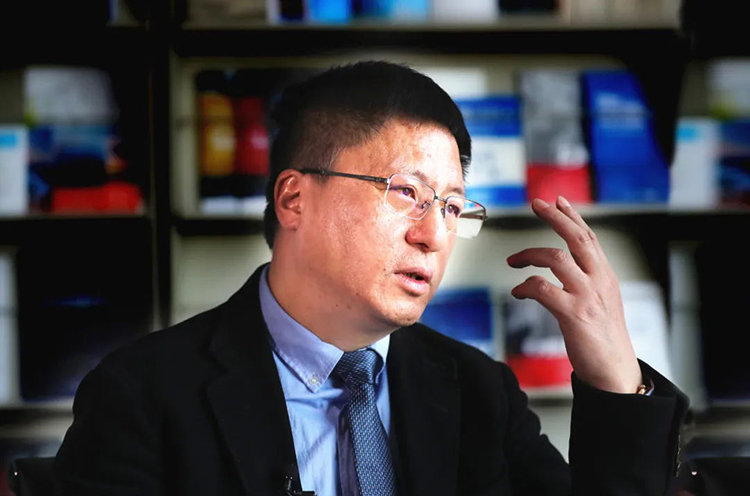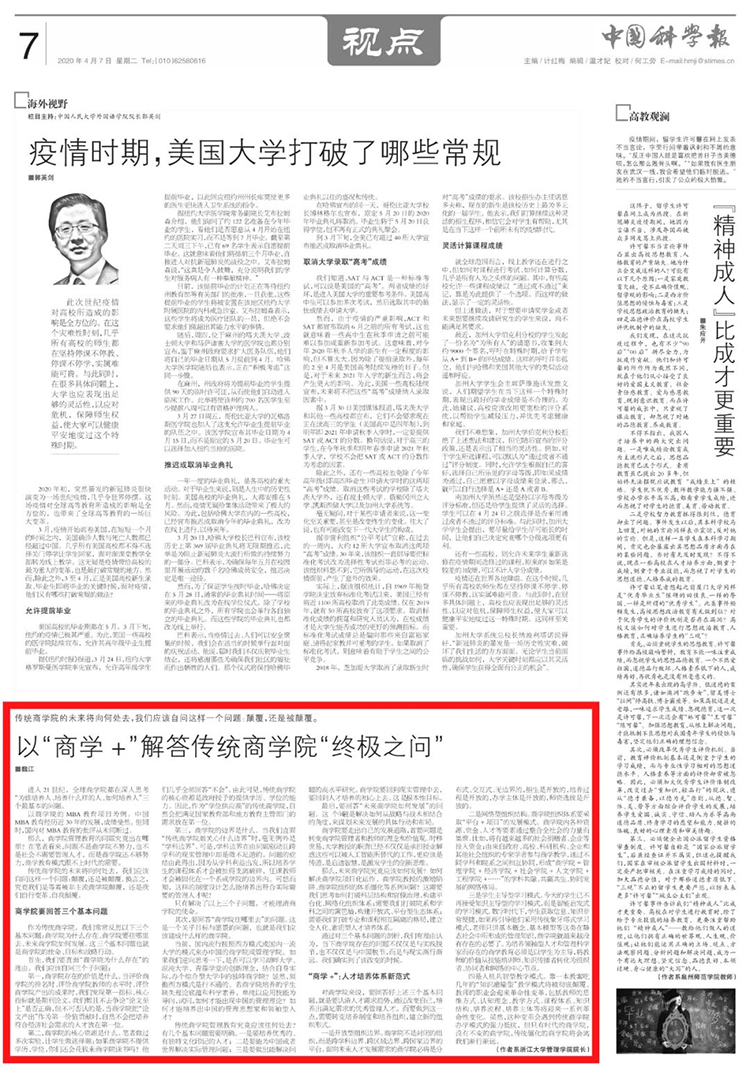What are the challenges in management education facing traditional business schools?
Why business schools exist? Where business schools forge ahead? How business schools evolve in the future? ......
Professor WEI Jiang,
Dean of School of Management at Zhejiang University,
asks himself and thinks about such "questions of the soul" every now and then.
As a professor who has integrated "cultivating the healthy power leading the future of China"
into his personal mission,
he has always been holding a self-critical and progressive mindset in the past decade,
combined with keen insight and deep thinking
on the changes of the times and the practice of global management education,
and constantly explored the business school's answers to
"for whom we cultivate talents, what are our expectations,
and how should we cultivate talents".

Professor WEI Jiang, Dean, School of Management Zhejiang University
At last, he found the “crux” of matter in traditional business schools,
and put forward the idea of self-disruption
when reflecting on the existence
and development of business schools.
The idea comprises the new paradigm of "Business Plus" talent cultivation system,
the development mode of business schools in comprehensive universities, the mechanism of platform + project, etc.
On April 7, 2020,
his article "To Answer the 'Ultimate Question' of Traditional Business Schools with 'Business Plus'"
was published
in the 7th edition of "Viewpoint" of China Science Daily.

China Science Daily
To Answer the 'Ultimate Question' of Traditional Business Schools with 'Business Plus'
As we enter into the 21st century, business schools around the world are pondering three fundamental questions: “for whom we cultivate talents, what are our expectations, and how should we cultivate talents”. Taking MBA programs as an example, China’s MBA education has been developing for nearly 30 years with great achievements; whereas the criticism on it has never ceased. What is the problem with our management education? In my opinion, it is not that business schools do not work hard, or that the society has sufficient management talents, but that the evolvement of our education approaches is lagging behind the needs of the times.
Where are we heading as conventional business schools? We should ask ourselves one question: to disrupt, or to be disrupted. Shall we wait for being disrupted by non-mainstream business schools, or shall we make self-transformation and self-disruption?
Three fundamental questions for business schools
As conventional business schools, we often reflect on the following three fundamental questions: Why should business schools exist? Where should business schools forge ahead? How should business schools evolve in the future? These three fundamental questions embody the mission, objective and strategic plan of business schools.
Ⅰ Why?
Let us examine the first question of why business schools exist from the following angels:
What is the value of business schools?
When ranking business schools, or assessing faculty competency, or evaluating the outputs of business schools, the top indicator or the key indicator often lies in the number of research publications. Setting aside the debate on whether “publications supremacy” is correct or not, it is undeniable that when considering research publications as the gold standard of value contribution, business schools will naturally drift away from putting the priority on cultivating talents to meet social and economic development needs.
What are the core resources of business schools?
I asked my students: would you still choose to study in business school at your own expense if no diploma or degree will be conferred? Almost all of them answered “no”. The core resource of business schools is their capability of offering diplomas and degrees authorized by governments. Therefore, being the “degree suppliers”, conventional business schools naturally place priority on meeting requirements by national and local education authorities.
What are the boundaries of business schools?
When confronting the question of what boundaries conventional business schools are most concerned with, the answer is definitely “discipline boundaries”. However, discipline boundaries are the most insignificant in the problem-driven and interdisciplinary exploration of management practice. The crux of the problem lies in that the curricular are fragmented by disciplines and faculty members are confined within the boundaries of academic departments or schools. How can we cultivate management talents to meeting social and economic development needs with such institutional design?
Only by addressing the above three sub-questions, the mission of business school would be clarified.

Ⅱ Where?
The second question of where business schools should forge ahead is closely related to business school objective and vision. In other words, what business schools should look like.
It is a common practice to adopt western model or the model of top universities to build Chinese business schools. What if we think in a reverse way and consider the possibility of applying the innovative concepts practiced by Hupan University, Hundun University and Qingteng University (universities which were financed and set up by enterprises, also known as corporate universities) and gear them to our own practice to run a unique business school? Apparently, blindly adopting the western model does not work. If business schools cultivate students only with pragmatic skills, lacking theoretical underpinnings and scientific literacy, how can we develop management thinkers and leaders in China?
Where exactly should conventional business schools’ management education head? Several points need to be clarified here. The first is to cultivate outstanding talents with unique cultural hallmarks; the second is to solve real-world management problems faced by China and the world; and the third is to produce high-impact and relevant research to address up-to-date problems and upcoming challenges. The fundamental objective for business schools is we shall get back to management practice and stay true to our founding mission of talent cultivation.
Ⅲ How?
The final question of how business schools evolve in the future is concerned with how to plan specific actions and layout for future development with a combination of strategy and tactics.
The primary issue for business schools to get out of their way is to transform the perceptions and values of their administrators and faculty. University faculty shall shift their responsibility from teaching and answering questions, which may be replaced by artificial intelligence, to enlightening and inspiring students’ innovative thinking.
What exactly should the future shape of business schools look like? How to solve a series of problems in connection with project-based operation, incentive traps for professors, and the rigidity of organizational structure? To answer these questions, we need to think about how to debottleneck the layered structure and bureaucratic governance and build a platform-based and network-based organizational system; we must break the boundaries of departments and schools to set up an open and platform-based ecosystem; and we must break the silos of programs and modules to build an all-around personalized and high-quality talent cultivation system.
We have full reasons to believe that business schools are not only disconnected from management practice, but actually a gradual departure from reality. It is time for us to make changes.

"Business Plus”: new paradigm of talent cultivation
To answer the three fundamental questions raised above, we should identify the trends of social development needs on talents and cultivate students to meet those needs. The only way to achieve this goal is by changing ourselves, not only transforming our cultivation system, but also setting up new organizational structure.
Open organizational boundary. Business schools are not closed organizations, but an interdisciplinary, cross-regional and transnational platform. To meet future talent demands, business schools must be distributed, interactive and borderless with open enrollment, cultivation process, teaching and learning as well as faculty selection and promotion.
Network-based organizational structure. The organizational structure of business schools shall adopt the “platform + project” development model. All resources, funds, talents and other elements of business schools shall be accumulated by letting different social forces to do their shares and perform responsibilities in education. For instance, attracting more social donators, enterprises etc. to invest; inviting experts and scholars from governments, academia, research institutes, enterprises and other social organizations to participate in teaching; utilizing the synergies of different disciplines and schools, to form the network landscape of mutual benefits, co-existence and synergetic development as “Business School=School of Management + School of Economics + School of Sociology + School of Humanities + School of Engineering + …….”
Student-led learning model. Our students no longer embrace the knowledge-oriented learning model, but intelligent heuristic learning model. In the digital era, ways for students to acquire information and knowledge are various and convenient. If professors deliver knowledge in the way of traditional ivory-tower-based model, imparting management knowledge and basic concepts and models developed in a static society, the existence of business schools seems to be increasingly unnecessary. Business education for the purpose of fostering leaders and scientists must be student-oriented, requiring the transformation of the role of professors from skill trainer and knowledge disseminator to organizer, coordinator and the central node of teaching and learning network.
Human-machine shared-intelligence learning model. “Knowledge-transfer” teaching model with a common teaching plan for years will be completely reversed. Teaching profession will be revolutionarily changed, leading to a series of thorough transformation with respect to ways of thinking, cognitive concepts, way of teaching, curricular, knowledge structure, cultivation process and business schools themselves. These changes may be strongly resisted by conventional business schools; however, only modern business schools can exist and those rigids will be further and further away from us.



